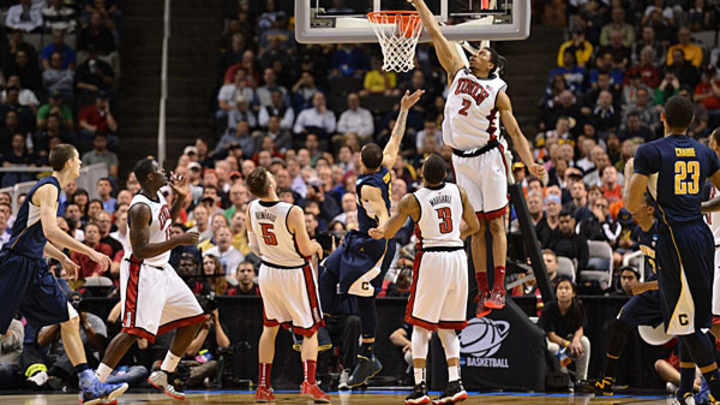NCAA selection committee must re-focus on bracket integrity and placement

Cal, a No. 12 seed, upset No. 5 UNLV in last year's NCAAs in a perfect example of improper seeding. (Roebrt Beck/SI)

The NCAA tournament selection committee has been gathered this week in Park City, Utah, to discuss the future of the event. While ESPN's Andy Katz notes a number of topics that the group may be discussing, the only one that really matters is the committee becoming more diligent in how it constructs the bracket.
Keeping teams closer to home and/or family is nice, and moving more games out of domes probably will lead to better atmospheres (and maybe marginally better shooting, if you believe in the dome effect). But those are issues that impact both teams and/or the overall presentation and feel of the event. The committee's primary purpose should be to construct the fairest bracket from competitive purposes, and that means getting the seeding as correct as possible and not disadvantaging higher seeds for the sake of satisfying another, less-important goal.
Having projected fields annually for a decade now and having gone through the media mock selection process a few years ago, I've come to grips with the rather sizable number of considerations the committee has to deal with in selection and seeding. Every year, there's discussion of snubs, but all in all, the committee has regularly done a fine job with who it puts in the field and a relatively good job in how the teams are then seeded.
Where I have always believed the committee falls a bit short, in part because the process as established doesn't allow enough time for thoughtful consideration, is in the actual bracketing process, where the committee creates the field. Last year's totally avoidable fiasco with 5-seed UNLV playing 12-seed Cal in San Jose was the latest example of situations that can be avoided had the committee spent a few more minutes working it out. In last year's case, all they had to do was move 12-seed Akron to a different region, but even if the solution is more complicated than that, the bracket deserves more attention than it gets.
The overriding philosophy of the committee is that you can play your way out of a bad seed, but not exclusion from the field, so they spend the majority of their time on selection. That makes sense as a base consideration, but the national championship tournament also should be set up as fairly -- and, yes, as entertainingly -- as possible, and that requires more time to be spent on the bracket placement process itself.
It also may require a change in some of the existing rules as conferences continue to swell in size. The current rules to avoid conference members facing each other often leads to the shuffling around of one-bid league entrants and lots of mid-on-mid violence on the opening weekend. While the committee has said in the past that these matchups guarantee advancement for at least one of the smaller-conference teams, it eliminates some of the David-vs.-Goliath magic of the event.
